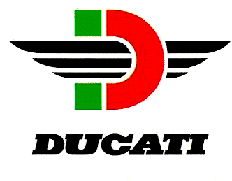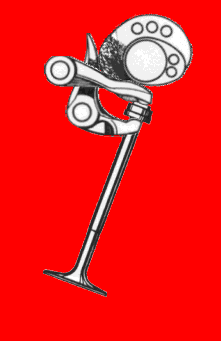|
|||
|
By Jeff Nations Donnie Unger lay motionless on the side of the
racetrack, with a broken back and a heart full of fear. He�d just been thrown from his Ducati
motorcycle during a Championship Cup Series (CCS) race at Virginia
International Raceway in After tumbling to a stop, Unger started doing
an inventory.
His fingers still worked and he had use his
arms, but a searing pain shot through his back and Unger had little feeling in
his left leg and none in his right. Nothing. That�s when he struck a deal with God. �When I was lying there, knowing my feet weren�t
working � as most people do, all of a sudden religion comes into play,� said
Unger, a 38-year-old �I said �God, you get me out of this one, let
me spend my time with my wife and my kids, then that�ll be it. No more
racing.�� The crash happened back on His road to recovery is nearly complete, but
the memory of his accident and the end of his racing career is never far from
his thoughts. ��� The bike�s suspension had been acting up all
season, and Unger was at wit�s end to solve the problem. He and his crew mates
with DUC Pond Racing had tried everything to correct the problem. The Ducati
would �chatter� at a certain angle and a certain load on the rear tire. With the racing season winding down, Unger
finally hit upon the solution during his last trip to VIR in early October. By
trying different wheel-tire combinations, he found the perfect setup by
switching to a narrower diameter on the rear tire. �It was a hundred percent better,� Unger
recalls. ��� Out of work since the accident, Unger just
returned on a part-time basis to his job as a mechanical and electrical
engineer in Three times a week, he works out at Three months into his rehabilitation, Unger
wears a back brace and walks with a pronounced limp. But he can walk, and
that�s what really matters. Doctors have told him the recovery process could
take up to a year, and he may never totally shake off the effects. �It�s a crapshoot,� Unger said. �The prognosis
is good, but there�s no guarantee. The leg�s got full range of motion and the
muscles are coming back really well. It looks good from my end. I�m not
complaining.� That upbeat personality defines Unger, whose
can-do outlook has made believers out of his friends and racing rivals for
years. �He�s a go-getter. He�s a doer,� said DUC Pond
teammate Bill Dietz of ��� Last race of the day at VIR, and Unger had the
suspension problem licked on his Ducati 900 SS. Entering the Super Twins event
is always a challenge, as Unger typically gives up 20 or 30 horsepower � or
more � to his rivals. Not that it has ever stopped him from trying to win. �He was probably giving up 40 horsepower to
everybody else,� said Dietz, who was racing right behind Unger. �He was a
charger and he got everything he could out of everything he rode. If he sees
somebody in front of him, he wants to pass.� ��� Unger has trouble storing all the trophies
he�s won in 19 years of motorcycle racing. In his younger days, he�d travel far
and wide to compete in CCS events. The results were impressive, totaling more
than 100 career wins and 400 top-five finishes. In all, he�s a 13-time
Mid-Atlantic and Southeast Regional champion. But his marriage to Julia five years ago and
the birth of his third child � 21/2-year-old Faith, along with Elizabeth
(12) and Joseph (10) � got Unger thinking about slowing down. He cut back on the travel schedule in 2001, but couldn�t give up the sport.
Not yet, anyway. Last season he had his greatest success on the track, winning the CCS
Middleweight National Final at Daytona Beach, Fla., his first national
championship. ��� It happened on the crest of a hill, what racers call an off-camber corner,
just after the cross over bridge. You dive into the corner with positive
banking and stay on the brakes, then accelerate as the corner goes uphill and
then flat and into a negative camber. Unger had hit that Turn 7 corner dozens of times without incident over the
years, but not this time. Trying to pass for the lead on the high side, Unger
felt the bike�s grip loosen on the oil-specked asphalt. �When I went around the outside the back end came around and I couldn�t
catch it,� Unger said. �I tried to catch it, but what happened was I didn�t do
it fast enough.� Thrown straight into the air off a bike running between 80 and 90 miles per
hour, Unger slammed onto the track surface before tumbling off to the side. ��� Racing motorcycles in excess of 100 miles an hour isn�t for the cautious. In
his years on the bike, Unger estimates he�s probably crashed around 30 times.
Prior to VIR, he hadn�t had an accident in two years. Despite all those sudden spills onto unforgiving surfaces, the worst injury
of Unger�s life came when he was 14. Diving through a hard rubber inner tube
floating in a pool, he�d been slightly off target and caught the inside rim.
The impact snapped his head back, breaking his neck. �You can still see the scars,� Unger says with a slight smile, then points
to his temple where a dime-sized mark remains from the halo used to stabilize
his spinal column. �They used some wire to fuse my neck solid.� ��� Dietz saw his teammate fall, but the crash didn�t look serious. The first
cornerworker to reach Unger thought the same thing. �He kept saying, �You�re fine, you�re going to be all right,�� Unger
remembers. �I said, �No, this is a bad one.�� ��� A crescent-shaped scar on his back will eventually be the only evidence of
Unger�s final racing accident. Even now he marvels at the X rays of his spine. One look, and it�s not hard
to imagine why. A titanium cage, supported by a pair of titanium rods, hold
together three vertebrae in his lower back. The procedure, done by a Danville neurosurgeon, took seven hours to
complete. Much of that work was just cleaning up the damage inside his spinal
column. �The pieces of bone were everywhere,� Unger said. �It�s called a burst
fracture, actually. It exploded the (L1) vertebra.� Just two days after the surgery, Unger was up and trying to move around with
the aid of a walker. That didn�t go well, as his right leg barely responded,
and Unger completed most of his weeklong Danville recovery in a wheelchair. He then stayed four days at the Winchester Rehabilitation Center, learning
to use the walker full-time and leaving only after demonstrating that he could
walk up a flight of stairs. After another month at his in-laws, Unger traded the walker for a cane and
returned home. �I think he handled it pretty well, probably better than I would have,� said
his father-in-law Hampton Hylton, a Winchester pediatrician. �He seems to have
accepted it as part of the consequences of his racing.� The cane is long gone and the back brace, decorated with the team logo and
his racing number by DUC Pond crew member Rob Glittone, is scheduled to come
off for good this month. Unger returned to his home right after Thanksgiving, already scheming of
ways to stay at the track. Racing is not an option. �I�m kind of the bad angel on his left shoulder saying �You�re going to do
it again, you�re going to do it again,�� Dietz admits. �I�ll give him six to
eight months, then he�ll be wanting to do it again. He won�t, but he�ll want
to.� �He will stay away,� Julia Unger asserts. �It�s a promise he made to himself
and to God, so I think it�s going to stick. �And if it doesn�t, there�s a long line of people ahead of me who�ll knock
some sense into him.� Unger�s doctors have told him point-blank that any more trauma on his spine
could mean paralysis, making the decision to quit the obvious one to choose. Obvious, but not easy. �That�s all I�ve known,� Unger said of his racing career. �That�s where my
friends are, at the racetrack.� DUC Pond team manager Ron Peddicord, who considers Unger one of the best and
smoothest riders he�s ever seen in the sport, grieves over the decision but
supports it. The accident came the weekend before DUC Pond�s scheduled return
trip to Daytona and Unger�s shot to defend his national title. �He would have won unless the (motorcycle) had blown up,� said Peddicord,
who was a spectator in Daytona for the race. �It�s not easy. Donnie�s been
riding for me since 1992. It�s hard to put somebody else on it � for him and
for me, too.� Unger was honored by the Mid-Atlantic Road Racer�s Club at its banquet in
Tyson�s Corner last month. Peddicord said Unger broke down during his
acceptance speech, and most of his fellow riders did as well. Racing, after all, has been a part of his life for nearly two decades. �I�m done,� Unger said, and he means it. �This�ll make six vertebrae in my
back that are fused together, and that�s enough. �I think God had to hit me with a two-by-four to get me to stop.� Unger still plans on spending lots of time at VIR and Summit Point Raceway,
just in a different role. While he was recovering at home, tinkering with racing bikes in the garage,
Unger hit upon the idea he hopes will keep him track-side. From now on, he�ll
run the service side of the business for DUC Pond � building bikes, machining
and ordering special parts, and doing high-performance engine and chassis work.
Unger can build a competitive motorcycle from scratch. The knowledge has all
been of the �on-the-job� variety. �When it comes to racing, you have to immerse yourself in it to learn it,�
Unger said. �You can�t pick up a book to figure it out.� And while he won�t race anymore, Unger has no plans to give up riding
motorcycles. He�s already taught classes for two years at VIR and has accepted
an offer to become a lead instructor for street riders at Summit Point. �We�re going to make sure that the street riders can become more acquainted
with the sport and have fun at the racetrack, and keep them safe,� said Unger,
who will also handle tech inspections at the track. �We do a lot of classroom
work.� Teaching up-and-comers gives Unger the added benefit of searching for his
replacement. Peddicord is looking forward to his new business relationship with Unger and
many more days at the track with his friend. �He�s a determined rascal, he is,� Peddicord said. �If you�d ever seen him
ride, you�d see it.� |




